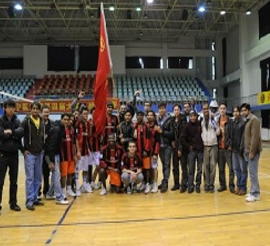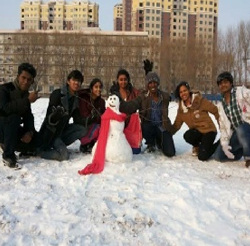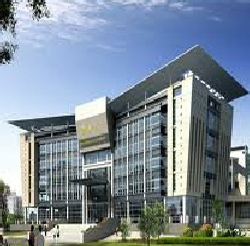
LMU Introduction
Liaoning medical university was founded in 1946 & is one of the higher provincial schools in the western part of Liaoning province. In 2006, with the approval of the State council of china, the former name Jinzhou medical university was changed after the name of the province as Liaoning medical University. Approved by the Academic Degrees committee under the state council, LMU became a university in 1999. Since, 2003 this university has been qualified to grant master’s degree to clinical medical graduate students.
The campus covers 1,140,000 square meters and lies in the north of the city. Six kind of education are offered in LMU; general high education, State-owned privately run education, adult education, vocational education, online education and international student’s education. The university enrolls undergraduate, graduate and master as well as postgraduate students. There are 16 teaching departments, 98 teaching offices, 56 teaching laboratories, 4 affiliated comprehensive hospitals and 169 bases for teaching and practice.
The university’s curriculum comprises 21 specialized undergraduate subjects, 32 master degree programs and 1 doctor degree. The university’s library has an advanced electronic reading room and has access to retrieval system for medical documents from the American MEDLINE and the Chinese Medical Institute.
The total number of students has amounted to 13,806 of which 390 are international students, all of whom are currently studying in the undergraduate program taught in English. Furthermore, the university is actively involved in international academic exchange activities with universities abroad, such as the University of Glasgow and regularly exchanges scholars and specialists to give lectures. About 120 teachers have been sent to more than 20 countries to study and involve in research.
The College of International Education
The college of international education was established in April 2004 as a part of the International Exchange Department of Liaoning Medical University. IED is a functional organization responsible for academic work related to foreign affairs. In practice, IED takes care of the managing, guiding, coordinating, and providing services for all the foreign related work in Liaoning Medical University. CIE is one of the youngest but the most vigorous departments in Liaoning medical university. It has been putting a lot of effort in recruiting medical students with multiple educational backgrounds. CIE provides medical courses for international medical graduates and at the same time offers the possibility for international students to get a better understanding of Chinese society and culture.
Educational Base
The university has set up 17 secondary level teaching units and 10 research centers. There are 14 branches of learning, which can grant master degree, 35 specialized undergraduate subjects and three key subjects of provincial level. The capacity of students is about 15000, presently; there are 219 professors or Chief Doctors, 533 Associated professors, 74 with Doctor Degree, 315 with master degree etc. Most of the faculty for the undergraduate course consists of National and International Professors trained from USA, UK, Canada and Belgium. Hundreds of teachers and researchers have won the honor of Excellent Teacher and talented person with great abilities for science and technology by national government and local government for their outstanding achievements.
English as the medium of instruction for foreign students has started since the year 2004. All classrooms are equipped with multimedia to facilitate easier and visual teaching methodologies.
Clinical Base.
There are four comprehensive hospitals and 169 teaching and practice bases, comprising nearly about 7000 beds. The affiliated hospitals are attached to the university and within the campus region. The graduate students are trained in General Hospital of People’s Armed Police in Beijing , Hospital 301 in Beijing , General Hospital of Aerospace in Beijing and General Hospital of Shenyang Military Command. The university comprises twelve teaching departments, ten provincial research centers, seven affiliated comprehensive hospitals and 122 outlets for teaching and practice. The curriculum comprises 23 specialized undergraduate subjects, 32 second level master degree programs, two first level master degree programs and one doctorate degree program. There are three provincial key subjects, one provincial key laboratory and five provincial key medical specialties. The number of graduate students is approximately 800 whilst undergraduate students total about 7000.
The first clinical school (The First affiliated Hospital)
The first affiliated hospital of Liaoning Medical University in western Liaoning province is the largest Hospital of Grade III set by the Ministry of Health. It is also one of the three regional medical centers. It provides 1800 beds for half a million patients from Liaoning, Jilin, Hubel and Inner Mongolia, more than 30000 patients receive medical hospitalized care and more than 10000 patients are treated by operation. There are 45 clinical medical departments, 4 research institutes and 25 teaching sections. Bone surgery and Otorhinolaryngology are two provincial level key subjects. The key laboratory of surgery is key laboratory set by medical department of Liaoning province. Brain and spinal cord injury and medical tissue engineering are two laboratories set by science department of Liaoning Province. The practice centre of clinical medical skills is a provincial model center.
School of Stomatology (The Second Affiliated Hospital)
The Second Affiliated Hospital was set up in 1992, which is an integrated hospital under the province. The hospital is mainly characterized by the diagnosis and treatment of oral cavity diseases. Meanwhile, it is also oral cavity medicine academy of Liaoning Medical University, which takes on the teaching tasks of undergraduates, graduate students, students abroad, at all levels in oral cavity field. The hospital is the council member unit of China stomatological Association.
The Third Clinical School (The Third Affiliated Hospital)
The third Affiliated Hospital of Liaoning Medical University was set up in 1922, and is one of the earliest hospitals of Grade III by the Ministry of Health as well as “baby-loving hospitals”. The hospital provides advanced medical equipment, such as 64 rows CT, magnetic resonance 1.5 T, DSA angiogram machine, linear accelerator, and digital operation rooms. Wards, cleaning centers and medical supply rooms are National level. Emergency rooms, ICU wards and CCU wards physical examination center and injection center are the most advanced in Jinzhou.
Key provincial subjects
Human Anatomy and Embryology
This subject began to receive postgraduate students in 1978 and was granted to confer Master degree in 1990. It was rated as one of the key provincial subjects in 2001. In 2003 the Anatomy Laboratory was evaluated to be one of the qualified ones at provincial level. Histology and Embryology were rated as outstanding courses in 2002 and excellent courses in 2003. The subject to train PhD, Post graduate students jointly with China Medical University in 2003. Human Anatomy was rated as an excellent course in Liaoning Province in 2004 and Local Anatomy in 2007.
Bone Surgery
This subject was authorized to confer Master degree in 1987. It was rated as a key Medical Specialty by the provincial government. There are now 2 innovative teams for Tissue Engineering, as one of the key provincial laboratories, undertakes projects for the National Natural Science Foundation. The department has undertaken more than 50 projects at various levels and has won 10 national and provincial awards. It offers many training programs in Liaoning Province, especially in the West Liaoning Region.
Otolaryngology
Otolarynology started to enroll postgraduate students in 1989 and was authorized to confer Master degree in 1993. It was rated as one of the key subjects by the province in 1997 and it was reconfirmed in 2008.
Key provincial Training Subjects
Pharmacology
This subject started to be authorized to confer Master degree in 1986. It was rated as one of the outstanding courses in 2008.
Key Laboratories
Medicine Tissue Engineering Laboratory
Its main researches include bone and cartilage tissue engineering research, central and peripheral nervous system injury regeneration research and vascular endothelial cell differentiation and capillary reconstruction study.
Brain and Spinal Cord Injury Laboratory
It focuses on cerebro vascular diseases, neurological diseases, brain tumors and researches spinal cord injuries. It has reached the leading national standards in the corresponding fields of research.
Animal products and Safety Engineering Laboratory
Surgery Key Laboratory.
Molecular Cell Biology and Drug Development key Laboratory
Library
The university’s library has an advanced electronic reading room and has access to the retrieval system for medical document from the American MEDLINE and the Chinese Medical Institute.
Borrowing Service
Books on natural science are to be found on the second floor of the library building, whereas books on social science are located on the fourth floor. You can use the computers next to the reception desks to find the book or want to borrow.
Reading Service
On the fifth floor of the library there is a periodical reading room, where you can read periodicals which are not allowed to be carried out of the library. On the third floor of the library there is an electronic reading room which is completely computerized and digitized. It contains millions of journals in Chinese and foreign languages.
AMENITIES
There are departmental stores, restaurants, post office, telephone booths, theatres, sports centers, gymnasiums and play grounds for all types of sports within the university campus. The Library in the campus is a modern construction having electronic audio visual components and the internet facility. Huge volume of reference books, magazines and medical journals are made available beside text books in English medium.
Restaurants
In addition to the university canteens and the public kitchen where students can cook for themselves, the university also has two restaurants. Both of them are base in the same building. One of them is an upscale Chinese restaurants, but inexpensive. The other one is a fast-food restaurant that offers Chinese, Western food and Indian food. It depends on what you want to eat, but on an average it costs 20 RMB a day to have two decent meals. Of course, students can also leave the campus to have meals. Just across from the main gate there are endless food stalls where they can buy very inexpensive Chinese and Jinzhou specialties. One of Jinzhou’s specialties is barbecue and barbecue restaurants can be found all over the city. In addition there are many other restaurants that offer specialities from all across China, such as Beijing Duck, Sichuan spicy food and so on. Meals in restaurants are not expensive; a meal for two should cost about 60 RMB, drinks included. Some western restaurants have also found their way into Jinzhou, including KFC and some real restaurants, most of which offer pizzas, pastas, western-style steaks and so on.
DORMITORIES
The Hostels are situated inside the Campus, well equipped and furnished, and separated for boys and girls. Adequate security is provided to international students hostels. There are two dormitory buildings with a total of 141 rooms for foreign students. In each room there is a small entry corridor with two closets and the door to the bathroom. The room itself is about 150 square feet. Each room is equipped with beds, a wardrobe, a desk and chair, a side table. Each room has at least one large window. In addition, central heat is provided by a radiator in the winter, and the rooms have individually controlled air-conditioners for the summer heat. Moreover every room has internet connection. The bathroom is comfortable. It is about 25 square feet. The toilet is western style. There is a sink and mirror. Apart from the rooms in the dormitory there is also a public kitchen with cooking utilities and refrigerators and a place where the students can have their meals. Normally international students share a room with another international student. The cost price is 5500 RMB a year. In case you don’t want to share a room, you can get a single room, the price of which is 11,000 RMB a year depending on the availability.
SPORTS FACILITIES
The campus offers a range of sports facilities. All over campus one can find basketball courts, volleyball courts, table tennis tables and there is also one football field. One of the buildings on campus houses a gym, which has a large selection of weight machines, dumbbells, plates, benches and a smith rack. There are no cardio machines, but aerobics classes are held twice daily. A membership card costs 25 RMB a month. Once a year the university holds a huge sports meeting in which Chinese as well as international students can compete against each other.
International co-operation
LMU has ties with overseas institutions, such as Toronto University, Laval University and New Fenland University in Canada, Saga University and Gunba University in Japan. The number of student studying at the university totals 13,806 with approximately 390 being international students, all of whom are currently studying in the undergraduate program which is taught in the English language. The university began to enroll overseas students in 1997 and since then the overseas student education programme has rapidly developed. The college of International Cultural Exchange was founded in the beginning of 2004. The college has enrolled overseas students from South Korea, India, Nepal and South Africa. In 2007 the college of International culture exchange changed its name to the “college of International Education” which comprises Administration, Teaching Affair and the centre for Teaching Chinese as a Second Language. Furthermore, the university is actively involved in international academic exchange programs with overseas universities such as the University of Glasgow in Scotland and regularly exchanges scholars and specialists to give lectures. To date over 100 teachers have been sent to more than 20 overseas countries to study and participate in select research programmes.
Some of the overseas universities and colleges cooperating with JMU in research work and scholarly exchange are University of Victoria (Australia), Ulste University (Britain), Konyang University (Korea), Laval University (Canada), Bashkortostan National Medical University (Russia).
Postgraduate Education
Post graduate education in LMU started in 1979, Master degree student in 12 specialties were trained through the joint program with China Medical University. Approved by the Academic Degree Committee under the State Council, LMU began to confer Master’s degree in 1983. In 1999, LMU began to confer Master’s degree to those who have qualifications equal to postgraduates. Since 2003, LMU has been qualified to grant master’s degree to students of the clinical medicine subjects. Approved by the Ministry of Education, LMU is qualified to confer Master’s degree to students of the Clinical stomatology subject. LMU possesses Five joint doctoral degree subjects , two first-class master degree subjects, and 32 second – class master degree subjects. There are 7 doctoral supervisors and around 392 master’s supervisors. The number of postgraduate students has amounted to about 1700. Moreover, there are 500 trainees in the postgraduate education. Now we have 6 training bases for postgraduate students; Beijing Military Police General Hospital, Aeronautics Center Hospital, the Second General Hospital of PLA Artillery , the General Hospital of PLA Shenyang Military Region , the General Hospital of PLA Jinan Military Region, and Shenyang 202 Hospital. The programs last for 3 years and provide students with practical knowledge and skill in the specialized areas as well as research skills to support life-long learning.
PG Specialties
Basic Medical Sciences
Human Anatomy and Histology and Embryology
Pathology and Pathologysiology
Forensic Study
Aviation, Spaceflight and Marine Medicine
Ophthalmology
Gynecology
Otorhinolorygology
Medical Imaging and Nuclear Medicine
Clinical test and Diagnosis
Epidemics and Medical Statistics
Physiology





